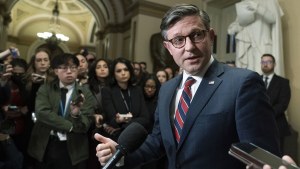Americans Want US Leaders to Focus More on China and Southern Border

Partisan differences guide assessments of where Washington should turn its attention.
Where do Americans want US leaders to focus their attention in the midst of so many international challenges and global conflicts? A joint Chicago Council on Global Affairs-Ipsos survey, fielded March 8-10, shows that, like so many hot topics today—ranging from immigration to climate change to even coffee—the answer depends partially on how one affiliates oneself politically.
When presented with a list of foreign policy issues, like the Ukraine-Russian conflict, the conflict between Israel and Hamas, the United States’ competition with China, and the US-Mexico border, Americans tend to say that US leaders are not giving the latter two issues enough attention (48% and 53%, respectively). They are equally divided on whether US leaders are giving insufficient attention (34%) or about the right amount of attention to the Ukraine-Russia war (34%). By contrast, a plurality of Americans is confident that US leaders are giving the war in Gaza the right amount of attention (42%).
Republicans Want More Attention on China and US-Mexico Border
However, these overall numbers are weighted heavily toward the judgement of self-described Republicans and Independents. Nearly two-thirds of Republicans say that US leaders are not giving enough attention to competition with China (64%), and an even higher majority say the same about the US-Mexico border (82%). These assessments coincide with those items that Republicans name frequently as a critical threat to the vital interests of the United States. When last asked in September 2023, seven in 10 Republicans deemed both large numbers of immigrants and refugees coming into the United States (72%) and the development of China as a world power (71%) to be critical threats.
By comparison, only 46 percent consider the military power of Russia to be a critical threat, and a February Chicago Council-Ipsos poll found that a majority of Republican Party supporters now oppose continued US economic and military aid to Ukraine. This helps to partly explain why a plurality of Republicans say US leaders give the Ukraine conflict (46%) too much attention. On Israel’s war in Gaza, slightly more say that leaders are giving the conflict about the right amount of attention (40%) than say giving it too much attention (35%). On this issue, Republicans are far more likely than other partisans to say that Israel is defending its interests and its military actions are justified.
Independents Agree with Republicans on Border, to a Lesser Degree
Independents tend to lean the same way as Republicans when it comes to the US border with Mexico, as a plurality says it does not receive enough attention from US leaders (45%). They tend to think that Washington is giving sufficient attention to the Israel-Hamas war (with a plurality of 40%) but not enough to US competition with China (though it’s close: 45% say it doesn’t receive enough attention, while 37% say it receives the right amount). These responses do not line up as neatly as Republican conceptions of critical threats facing the country. For Independents, no more than half consider the development of China as a world power (52%), the military power of Russia (41%), or immigration (39%) to be critical threats.
At the same time, however, February surveys show that a slim majority of Independents continue to favor US assistance to Ukraine. In the March Chicago Council-Ipsos poll, roughly equal amounts of Independents say that US leaders do not give the Russia-Ukraine conflict enough attention (35%) as say it receives the right amount (34%). However, a quarter say the US leaders give the conflict too much attention (24%).
Democrats Think More Attention Needed for Ukraine and Immigration
For their part, roughly half of Democrats believe China’s development as a world power (52%) is a critical threat to the United States, with most Democrats expressing concern over China’s human rights policies and its economic power. While a plurality of Democrats think US leaders are paying the right amount of attention to US competition with China (45%), many say it has not been enough (39%).
While not feeling directly threatened by Russia (just 51% consider Russia’s military power a critical threat), Democrats continue to favor continued US military and economic assistance to Ukraine, perhaps in part to defend a fellow democracy. In fact, a plurality of Democrats also say that US leaders are not paying enough attention to Kyiv’s needs (49%), with 37 percent saying that Washington is giving the appropriate level of focus.
There are some important divisions within Democratic Party supporters on the issue of Israel’s military action in Gaza, with liberal Democrats much more likely than moderate Democrats to support the United States pressuring Israel to stop its war. While a plurality of nearly half of Democrats say US leaders are giving the conflict the right amount of attention (48%), a third believe they are not giving enough (32%).
While only 18 percent of Democrats name immigration as a critical threat, the issue is raising some concerns for a plurality of Democrats, with 40 percent saying US leadership is not giving the border sufficient attention. The rest are divided between 30 percent who say the level of attention has been appropriate and 26 percent who say US leaders have given the issue too much attention.
This data comes from a joint Chicago Council on Global Affairs/Ipsos survey. It was conducted March 8–10, 2024, by Ipsos using its large-scale, nationwide, online research panel, KnowledgePanel, among a weighted national sample of 1,024 adults 18 or older living in all 50 US states and the District of Columbia. The margin of sampling error for the full sample is ±3.2 percentage points including a design effect of 1.12. The margin of error is higher for partisan subgroups.
The data for the total sample were weighted to adjust for gender by age, race/ethnicity, education, Census region, metropolitan status, and household income using demographic benchmarks from the 2023 March Supplement of the Current Population Survey (CPS). Specific categories used were:
- Gender (Male, Female) by Age (18–29, 30–44, 45-59 and 60+)
- Race/Hispanic Ethnicity (White Non-Hispanic, Black Non-Hispanic, Other, Non-Hispanic, Hispanic, 2+ Races, Non-Hispanic)
- Education (Less than High School, High School, Some College, Bachelor or Higher)
- Census Region (Northeast, Midwest, South, West)
- Metropolitan Status (Metro, Non-Metro)
- Household Income (Under $25,000, $25,000–$49,999, $50,000–$74,999, $75,000–$99,999, $100,000–$149,999, $150,000+)
Partisan identification is based on how respondents answered a standard self-identification question: “Generally speaking, do you think of yourself as a Republican, a Democrat, an Independent, or what?”



Related Content
 US Foreign Policy
US Foreign Policy
For the first time, a majority of Republicans think the United States should stay out of world affairs.
 US Foreign Policy
US Foreign Policy
A plurality of Americans—and a majority of Republicans—also say that US leaders are not paying enough attention to US-China competition.
 Public Opinion
Public Opinion
However, Republican support for providing US assistance continues to steadily decline.
 US Foreign Policy
US Foreign Policy
Republicans with very favorable views of Trump are more likely than other GOP backers to support deportations for undocumented immigrants.